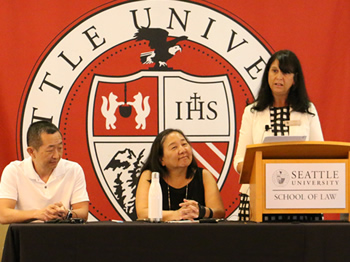Before coming to law school, Seattle University School of Law's newest students were artists and engineers. They served in the military and on political campaigns. They were advocates and athletes.
Dean Annette E. Clark '89 welcomed them all at 1L orientation this week with a reminder that their differences are exactly what makes the law school community special.

"What's so lovely is that every one of you has a unique story to tell, and brings unique gifts and experiences to your law studies," she said. "We will all be the beneficiaries of what you have to teach us while you're here."
This year's entering class is comprised of 219 students — 183 full-time and 36 part-time. The average age is 27, though the range spans from 20 to mid-50s. Sixty-three percent are women, with the remaining 37 percent men.
Four percent are veterans, 32 percent are students of color, and 19 percent identify as LGBTQ.
Though the majority are from Washington, the new students represent 29 states and 104 undergraduate institutions, including UCLA, Northwestern, and Oberlin College.
At orientation, Dean Clark emphasized Seattle University's values of dignity and respect for all, care of the whole person, academic excellence, diversity and inclusion, justice, and leadership.
She also reminded incoming students that lawyering is both a profession and a privilege.
"We believe that lawyers have a special and a vital role to play in safeguarding our democracy, our Constitution, and the civil rights of those who are within our boundaries," she said.
As illustration of that point, students heard about one of the most well-known civil rights cases in U.S. history. Fred T. Korematsu was a Japanese American man who refused government orders to report to an internment camp during World War II. The law school's Korematsu Center for Law and Equality advocates for civil rights in continuation of his legacy.
Professors Lorraine Bannai and Robert Chang, who lead that center, said the Korematsu case illustrates the best and the worst of the legal profession. Government lawyers took a "win at all costs" approach to the case, even concealing documents, while Mr. Korematsu's lawyers defied popular opinion and the U.S. President in order to represent him.
Professor Bannai, whose book "Enduring Conviction" tells the story of Fred Korematsu, said the case proves that the law is only as good as the people creating and enforcing it.
Dean Clark urged students to remember their personal values and experiences as they enter the legal profession.
"Don't put away the person who you are in order to become a lawyer," she said. "Instead, work to integrate your role as lawyer into your life. Hold on to your values, your moral center, and remember what brought you to law school in the first place."
